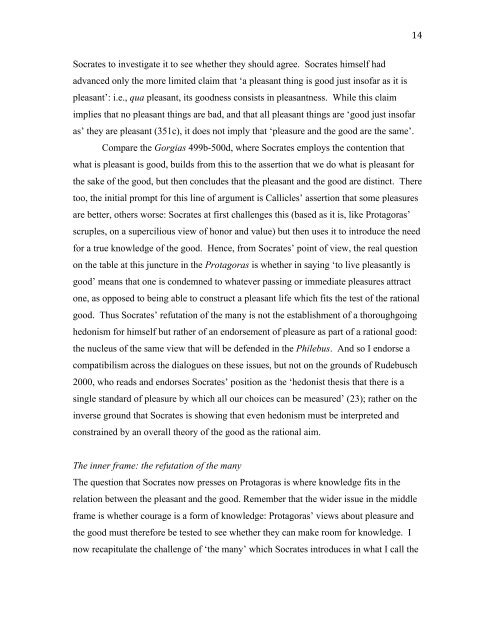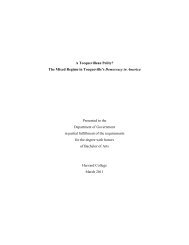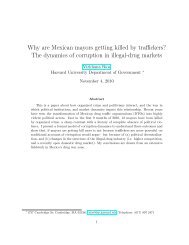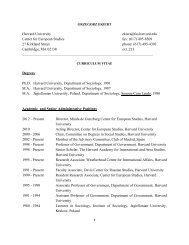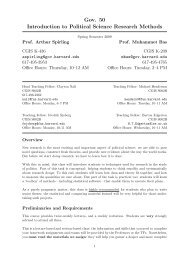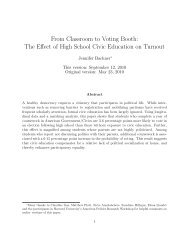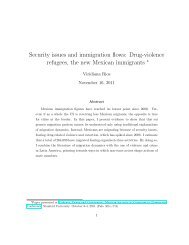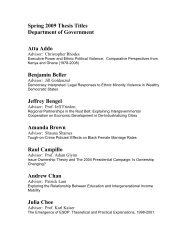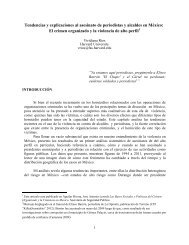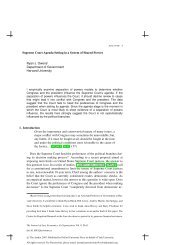1 Harvard University Political Theory Colloquium For 11 March 2010 ...
1 Harvard University Political Theory Colloquium For 11 March 2010 ...
1 Harvard University Political Theory Colloquium For 11 March 2010 ...
Create successful ePaper yourself
Turn your PDF publications into a flip-book with our unique Google optimized e-Paper software.
14 <br />
Socrates to investigate it to see whether they should agree. Socrates himself had<br />
advanced only the more limited claim that ‘a pleasant thing is good just insofar as it is<br />
pleasant’: i.e., qua pleasant, its goodness consists in pleasantness. While this claim<br />
implies that no pleasant things are bad, and that all pleasant things are ‘good just insofar<br />
as’ they are pleasant (351c), it does not imply that ‘pleasure and the good are the same’.<br />
Compare the Gorgias 499b-500d, where Socrates employs the contention that<br />
what is pleasant is good, builds from this to the assertion that we do what is pleasant for<br />
the sake of the good, but then concludes that the pleasant and the good are distinct. There<br />
too, the initial prompt for this line of argument is Callicles’ assertion that some pleasures<br />
are better, others worse: Socrates at first challenges this (based as it is, like Protagoras’<br />
scruples, on a supercilious view of honor and value) but then uses it to introduce the need<br />
for a true knowledge of the good. Hence, from Socrates’ point of view, the real question<br />
on the table at this juncture in the Protagoras is whether in saying ‘to live pleasantly is<br />
good’ means that one is condemned to whatever passing or immediate pleasures attract<br />
one, as opposed to being able to construct a pleasant life which fits the test of the rational<br />
good. Thus Socrates’ refutation of the many is not the establishment of a thoroughgoing<br />
hedonism for himself but rather of an endorsement of pleasure as part of a rational good:<br />
the nucleus of the same view that will be defended in the Philebus. And so I endorse a<br />
compatibilism across the dialogues on these issues, but not on the grounds of Rudebusch<br />
2000, who reads and endorses Socrates’ position as the ‘hedonist thesis that there is a<br />
single standard of pleasure by which all our choices can be measured’ (23); rather on the<br />
inverse ground that Socrates is showing that even hedonism must be interpreted and<br />
constrained by an overall theory of the good as the rational aim.<br />
The inner frame: the refutation of the many<br />
The question that Socrates now presses on Protagoras is where knowledge fits in the<br />
relation between the pleasant and the good. Remember that the wider issue in the middle<br />
frame is whether courage is a form of knowledge: Protagoras’ views about pleasure and<br />
the good must therefore be tested to see whether they can make room for knowledge. I<br />
now recapitulate the challenge of ‘the many’ which Socrates introduces in what I call the


